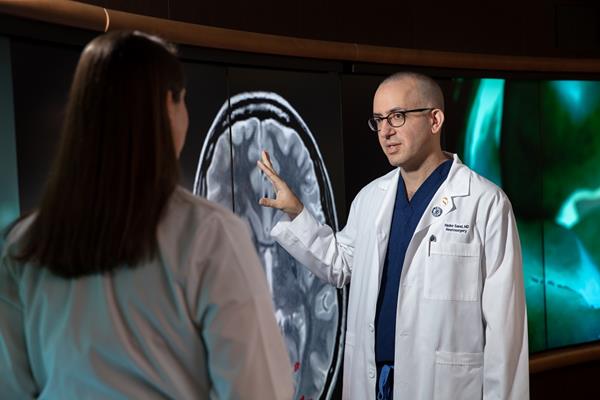Study designed to rapidly assess drug’s ability to penetrate the blood-brain barrier in humans
| Source: Ivy Brain Tumor Center
Phoenix, AZ, March 10, 2021 (GLOBE NEWSWIRE) — The Ivy Brain Tumor Center at Barrow Neurological Institute has announced the first patient has been treated in a Phase 0 clinical trial of pamiparib in newly diagnosed glioblastoma (nGBM) and recurrent glioblastoma (rGBM). This is the first Phase 0 clinical trial open to newly diagnosed glioblastoma patients. Pamiparib is an investigational small molecule PARP inhibitor from BeiGene, Ltd. PARP is a protein that plays an important role in cell survival response to DNA damage.
Nine out of 10 people diagnosed with glioblastoma, the most aggressive and common primary brain tumor, will not survive beyond five years. The current standard of care consists of maximal surgical resection, followed by radiation and a chemotherapy drug called temozolomide (TMZ). This treatment regimen extends the average survival to only 15 months, and forty percent of glioblastoma patients do not respond to TMZ at all.
“Radiation is the only modality that has proven to have a survival benefit for all glioblastoma patients. We are excited to investigate pamiparib in this Phase 0 study as part of our efforts to identify drugs that can be used to increase the efficacy of radiation treatment for glioblastoma,” said Shwetal Mehta, Ph.D., chief operating officer and deputy director of the Ivy Brain Tumor Center.
The Ivy Center will enroll 12 nGBM patients and 18 rGBM patients in this investigator-initiated Phase 0 clinical trial. Patients enrolled will take the study drug for four days leading up to a scheduled operation to remove their tumor. Within days of the operation, the Ivy Center’s team will determine if the drug penetrated the tumor. Patients with positive results may advance to an expansion phase of the study, which combines therapeutic dosing of pamiparib with fractionated radiotherapy. If pamiparib does not show evidence of sufficient tumor penetration, patients can pivot to another therapy or clinical trial without losing time or receiving ineffective treatment.
“In over 15 years of funding brain cancer research, I have never seen a clinical trial design with more urgency and focus on the patient than the Ivy Center’s Phase 0 approach,” said Catherine Ivy, founder and board president of the Ben & Catherine Ivy Foundation.
“Part of the reason new drugs have not emerged for glioblastoma in over three decades is that the vast majority are incapable of crossing the blood-brain barrier and getting to the tumor. Every new Phase 0 study at the Ivy Center offers another avenue of hope for identifying a therapy that will increase life expectancy for glioblastoma and contribute to a cure,” said Nader Sanai, M.D., director of the Ivy Brain Tumor Center.
“This trial is significant, both because it is open to newly diagnosed glioblastoma (nGBM) patients and because it is a chance to better understand pamiparib’s ability to cross the blood-brain barrier,” said Yong (Ben) Ben, M.D., Chief Medical Officer, Immuno-Oncology at BeiGene. “The Ivy Brain Tumor Center has built an incredible team to execute on this research. They are committed to their patients while they work to make much-needed progress towards new treatment options. We are thrilled to work with them on this historic clinical trial.”
To learn more about this Phase 0 clinical trial, including eligibility criteria, visit: https://clinicaltrials.gov/ct2/show/NCT04614909.
###
About Ivy Brain Tumor Center
Ivy Brain Tumor Center at the Barrow Neurological Institute in Phoenix, AZ is a non-profit translational research program that employs a bold, early-phase clinical trials strategy to identify new treatments for aggressive brain tumors, including glioblastoma. The Ivy Center’s Phase 0 clinical trials program is the largest of its kind in the world and enables personalized care in a fraction of the time and cost associated with traditional drug development. Unlike conventional clinical trials focusing on single drugs, its accelerated trials program tests therapeutic combinations matched to individual patients. Learn more at IvyBrainTumorCenter.org.
About Pamiparib
Pamiparib is an investigational inhibitor of PARP1 and PARP2 which has demonstrated pharmacological properties such as brain penetration and PARP-DNA complex trapping in preclinical models. Discovered by BeiGene scientists, pamiparib is currently in global clinical development as a monotherapy or in combination with other agents for a variety of solid tumor malignancies. Clinical trials of pamiparib also include a Phase 1b/2 trial (NCT03150862) in combination with radiation therapy and/or temozolomide in patients with first-line or recurrent/refractory glioblastoma. To date, more than 1,500 patients have been enrolled in clinical trials of pamiparib.
A New Drug Application (NDA) for pamiparib for patients with ovarian cancer has been accepted and granted priority review by Center for Drug Evaluation (CDE) of the China National Medical Products Administration (NMPA) for the treatment of patients with deleterious or suspected deleterious germline BRCA-mutated advanced ovarian, fallopian tube, or primary peritoneal cancer who have been treated with two or more lines of chemotherapy.
Melinda Langdon
Ivy Brain Tumor Center
623.297.1317
melinda.langdon@ivybraintumorcenter.org

